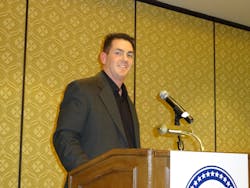GM battles counterfeit scan tools, aftermarket specialist tells automotive task force
Counterfeit scan tools have created problems for automotive technicians who have purchased them, either unknowingly or with the hope of saving money. During the Automotive Aftermarkets Parts Expo, the National Automotive Task Force (NASTF) hosted Bob Stewart, customer care and aftersales for General Motors Co. at its fall annual meeting at the Sands Expo Center, to offer his perspective on counterfeit tools and what can be done about them.
Stewart noted that the Internet has created “loose sharing of intellectual property.” This includes the sale of products that are sold in violation of copyright laws.
Stewart said there are three types of products that violate intellectual property rules: clones, counterfeit products and products sold by diversion. A clone is a product that is a copy of another product. A counterfeit product is one that is sold with the intention of defrauding the buyer. Diversion occurs when a product is sold by an unapproved source.
Buyers can know a tool is counterfeit by its low price, Stewart said. He said most scan tools sold over the Internet for a low price are counterfeit. He noted that the only way to prevent these products from being sold is for people to stop buying them. “To whatever strategy we put in place, they (sellers of counterfeit products) will adapt to it,” he said.
Problems that buyers of counterfeit products encounter include quality issues. These tools carry a lot of risks because they result in misdiagnoses, they have no warranties and no technical support.
“What’s the reward?” Stewart asked. “You save (money) upfront.”
He showed pictures of counterfeit GM software. Some of the software CDs have pictures of pink pandas on them.
Stewart did not want to give all the characteristics of counterfeit tools in a public forum because doing so would make it possible for the manufacturers of these tools to correct some of the identifying characteristics.
He showed pictures of interior circuit boards of some of these tools that have poor workmanship.
Stewart noted that China is the leading source for counterfeit goods.
He noted that GM is involved in combatting counterfeit tools in various ways. The company is working with customs officials in many countries to alert them to these goods. Enforcement agencies have raided factories, distributors and retailers of these products.
GM also takes legal action against sellers of these tools, both civil and criminal actions.
The company has involved the FBI, Homeland Security, Customs and Border Patrol and the U.S. Postmaster in its efforts to battle counterfeiters.
“Our best solution is to affect the demand,” he said.
He noted that a poll done by the International Automotive Technicians Network found that only 6.3 percent of its members ever knowingly bought a counterfeit scan tool.
“If the deal is too good to be true, it probably is,” he said.
During the question and answer period, Hughes was asked if the problem will become less severe as Internet cloud-based information replaces imbedded data tools. Hughes said this is possible, but “as soon as we put something in place, they find a way around it.”
He said the company relies a lot on industry members to advise them of counterfeit tools being sold. He encouraged people in the audience to contact the company when they come across these tools.
He noted it is not illegal to own a scan tool; only to sell one.
